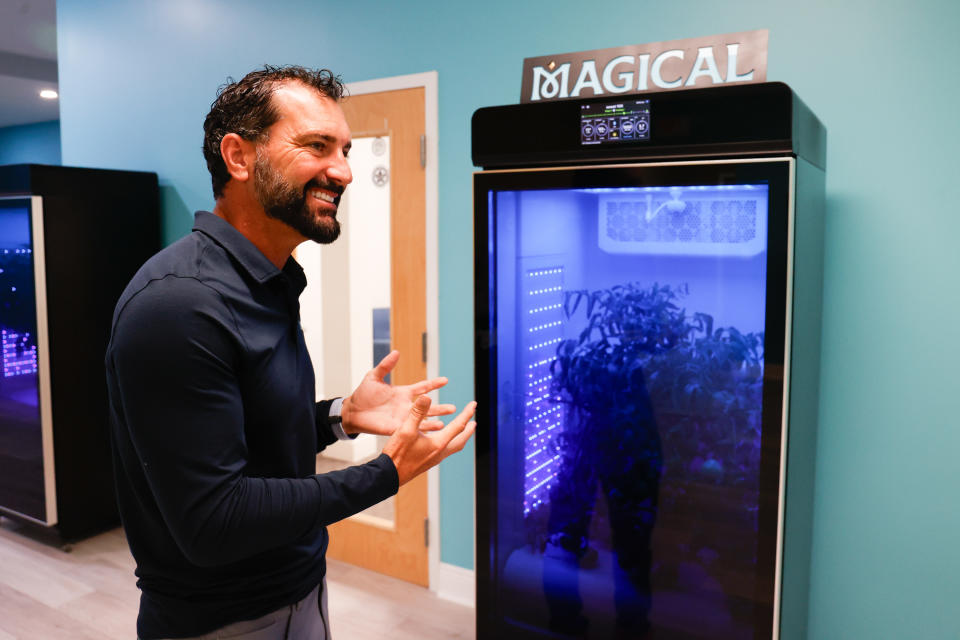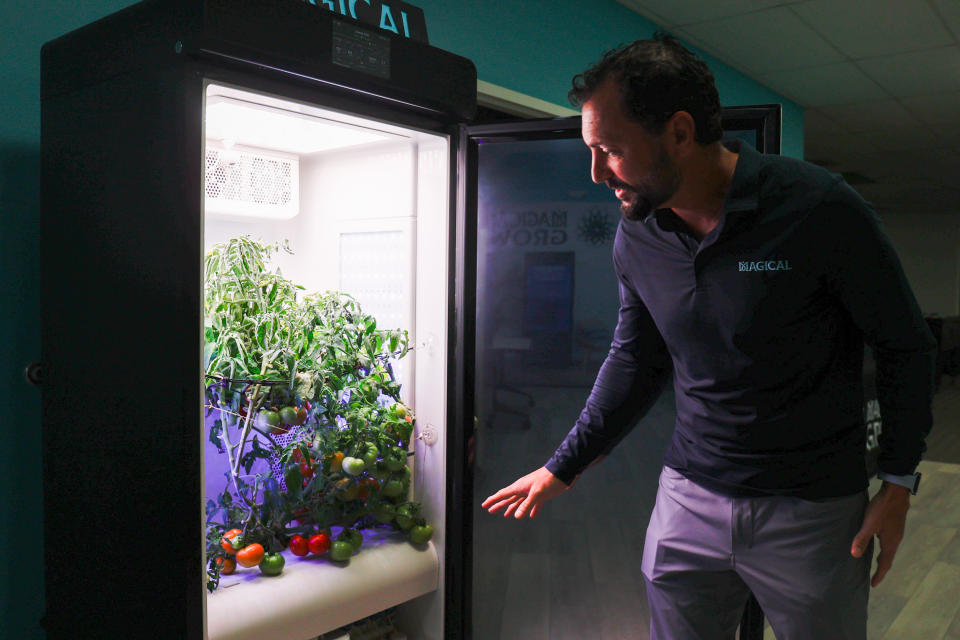Years after Joe Redner’s fight, voters could decide on growing marijuana at home
Moriah Barnhart is exhausted.
But the Tampa mom keeps going. She’s caring for her 12-year-old daughter, Dahlia, who uses a specific strain of cannabis — without psychoactive properties — to treat a rare and debilitating form of brain cancer. Barnhart wants to grow that strain of cannabis at home rather than rely on dispensaries. She’s not the only one, she said.
Eighteen states allow growing marijuana at home, 16 of which also allow recreational use. Florida isn’t one of them. So she’s leading the charge to change the law.
Barnhart’s fight may call to mind the saga of Joe Redner, the strip club king of Tampa who tried and failed to win a personal right to grow marijuana at home to treat his stage four lung cancer. Friends of Redner maintain that the state constitution already allows patients to grow their own cannabis. A Florida appeals court dismissed that logic.
Barnhart said Redner’s court case only went so far.
Had he won the case, “it would be for him and him only,” she said. But, she added, Redner educated the public on home grow.
Barnhart is spearheading a petition that could allow Florida voters to decide next year whether all qualifying medical patients can grow their own cannabis at home.
About 200 dispensaries around the state have agreed to display copies of that petition, possibly starting this month, Barnhart said. Some of those dispensaries are owned by two top medical marijuana companies in Florida, Trulieve and Surterra, which have publicly endorsed the idea.
But the major dispensaries have yet to support Barnhart’s campaign with big-dollar donations.
Barnhart said her daughter is the prototype of a medical patient looking to grow marijuana at home: someone who uses a specific strain under the advice of a doctor. Parents with sick kids often feel like they don’t have any option but to break the law and grow at home, she said.
Barnhart said she’s motivated to help others besides Dahlia.
“I could have taken my daughter out-of-state and gotten all the product we needed,” she said. “But it just seemed outrageously unfair that there would be so many people without the friends and connections we have, who couldn’t have that thing.”
In 2020, Barnhart helped launch the cannabis advocacy group Women’s Initiative for a Safe and Equitable Florida. Two years later, she registered a political action committee, Wise and Free Florida, dedicated to getting home grow on the 2024 ballot.
How likely is it that this will pass?
Barnhart has chronicled the steps to get a grassroots initiative on the ballot on her Facebook page. In recent years, Barnhart, other moms and nonprofits have spent over $100,000 to promote home grow at the state level. The political campaign, Wise and Free Florida, has disclosed only about $4,000 in contributions this year.
Barnhart set an end-of-year deadline for collecting the near-900,000 signatures required for Florida Supreme Court review. She’s got a long way to go.
Three hurdles stand before Barnhart. Collecting enough signatures is her first challenge. From there, the process gets more complicated.
Once the state validates those signatures, petitions for ballot amendments must withstand scrutiny from the state Supreme Court, a body that rejected two marijuana-related ballot initiatives in 2021 on the grounds that they were misleading to voters. Only with the blessing of the Florida Supreme Court can a proposed amendment appear on the ballot, where it would need approval from 60% of voters.
Trulieve is waging its own campaign to get a measure on the 2024 Florida ballot that would allow adult recreational use of marijuana. The group has gathered the necessary signatures. In late June, the state attorney general filed her first opposition brief, arguing that the petition’s language misleads voters. A state Supreme Court ruling may not come until early next year, said Dustin Robinson, an attorney and founding partner for Mr. Cannabis Law.
Meeting the signature requirement took nearly $40 million from Trulieve, Robinson said. Trulieve might find it worthwhile to throw some dollars behind home grow “from a PR perspective,” he said, but it’ll take more to jumpstart a sleepy petition.
“I think the money is going to be a big challenge for [Barnhart],” Robinson said. “She will most likely run out of time.”
With more focus on the recreational marijuana measure, Barnhart’s “home grow” amendment might not get enough attention this year, said Jeff Marks, an attorney and business partner of Redner. But the outlook could improve, he said.
If recreational usage becomes legal, “it’ll be so ubiquitous ... that the interest in regulating home grow will just disappear,” Marks said. “It might be illegal on the books, but unless your backyard was filled with 1,000 cannabis plants, what individuals want to do in their homes just isn’t really of any interest to anybody.”
As for Redner himself, he’s mindful of his own bruising legal battle. Then, a First District Court of Appeal judge ruled that the state’s definition of medical “use” of marijuana “does not mean ‘grow’ or ‘process.’”
While Barnhart is petitioning to change the constitution, Redner said he still doubts Attorney General Ashley Moody will make it easy to get home grow on 2024 ballots.
How businesses could capitalize
Garyn Angel is a Tampa cannabis entrepreneur who first came to the scene in 2013 with a device called “Magical Butter.” It allows consumers to extract certain ingredients — such as the psychoactive ingredient in hemp and marijuana plants known as THC — and infuse the extract into food. The device has raked in $70 million in sales.
Now he’s back with a machine called Magical Grow, a system that uses artificial intelligence to grow a “perfect” plant. Just buy a seedling, fill the machine with water and watch it grow, he said.
The device uses artificial light, air filtration, a nutrient dispensing system, water and just a touch of soil to adjust and optimize the growing conditions for the plant. One version of the machine is roughly the size of a refrigerator and costs $4,000.
Sales for the machine, which went on the market in June, are split between cannabis operations that need to make specific strains for medical patients and high-end buyers, including home developers, who want to put the machine in kitchens so residents can grow vegetables, or whatever else they want.
For cannabis, Angel said, “what we do is we really focus on one plant, one patient, one recipe, so that finished product is incredibly tight. We want that patient experience to be tremendously consistent.”
The machine is ready-made to grow marijuana at home. Joseph Dorsey, director of food sustainability and security at University of South Florida, said small-scale devices like Magical Grow already exist. What makes Angel’s machine unique, he said, is how discreet it is.
“You can grow it without people knowing you’re growing it,” he said.
Barnhart calls Angel “a very close personal friend.” She’s hoping the two will team up to market the machine and her ballot initiative.
As for medical marijuana companies, they’re not fretting about how home grow might hurt their bottom line.
“I’m living in a state where I can grow 12 plants in my backyard, and the industry is alive and well and just had record sales in the last month,” said Lynnette French, a Massachusetts resident and chief operating officer of Surterra’s parent company, Parallel.
Growing marijuana at home might be cheaper, but “it’s complicated to actually get it from seed to flower state” intact, French said. That reality will keep consumers from cultivating cannabis purely at home.
Home grow could also help expand product lines for medical dispensaries, Marks said.
“If you’re like Trulieve ... it’s not unrealistic that you would want to sell seeds and clones,” he said.
With businesses and patients in line, two questions linger: how public support will measure up, and how the state Supreme Court will react. Home grow, unlike recreational marijuana, hasn’t drawn opposition from Gov. Ron DeSantis or other state officials yet.
Barnhart thinks the language of the petition could clear court scrutiny. But she knows full well that it comes down to money.
“Even if there’s no opposition, how much tangible support will there be?” Barnhart said. “Who’s going to do the grueling work behind the scenes?”
What keeps her up at night is whether she can find the energy to keep going.
“We’ve got to get help,” she said. “This is too much for any one person.”


